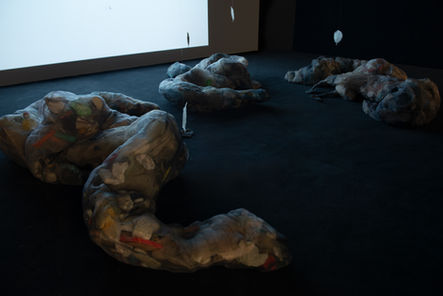
The Body as Threshold is a multimedia installation consisting of an experimental CGI film and sculptural elements. Drawing on Judith Butler’s notion of violence as a force field—diffuse, structuring, and entangled with grief—and on Thom van Dooren and Deborah Bird Rose’s understanding of extinction as an ongoing collapse, the work explores layered relationships between bodies, materials, and systemic harm.
The film unfolds within a speculative digital landscape: an island shaped by the entanglement of land, species, and waste. Albatrosses and plastic debris inhabit this collapsing ecology, where gestures of care become fatal, and where contamination and survival are tightly knotted. A flying camera navigates this oceanic garbage patch, revealing sites where violence, disrupted temporalities, and the breakdown of “coherent” narratives emerge.
The installation invites viewers to confront the interdependence and precarity of the more-than-human world. Mourning is not positioned as an endpoint, but as an ethical stance—a first gesture toward reconfiguring how we grieve, love, and remain accountable in the face of ongoing loss.
Scattered throughout the space are sculptural seating forms filled with plastic waste collected in collaboration with a collective from Menorca—materials akin to those found in the stomachs of dead seabirds. These sculptures act as both ergonomic supports and conceptual tricksters: they welcome the body while confronting it with the weight of complicity. They offer spaces to sit, pause, and stay with the trouble—making grief tangible, relational, and shared.
Film: CG experimental film | 00:15:00 | Color | Stereo Sound
Sculptures: 3D printed PLA, plastic trash from the Mediterranean Sea, upcycled plastic mesh from land agriculture.
Music Composition: Camille Mandoki
CG Supervision: Nathan Schönewolf
Text Supervision: Lisa James
Print Coordination: Claudia Trekel and Heiko Diekmeier
Plastic Collection: Association Per la Mar Viva and Carlos Salord
Donated Materials for the Sculptures: Joachim Kamphausen from the organic farm Lensenhof
We sneak into the interstices of the anthropological machine and make ourselves at home! The castle is open!
The exhibition Into the Open! Multispecies Narratives presents installations, video and sound works, sculptures, and performances by students from the seminar Multispecies Storytelling (Professors Hörner/Antlfinger and Pascal Marcel Dreier) at the Academy of Media Arts Cologne.
In his book The Open: Man and Animal (2003), philosopher Giorgio Agamben describes the anthropological machine as a structure of thought that defines the human in contrast to the animal—whether through inclusion or exclusion. This machine continually draws a boundary, producing what is considered "human" by positioning certain beings inside or outside of this category.
The Open, by contrast, is a space where beings can become indistinguishable from one another; it is a site of possibility from which the gaps in the anthropological machine can be infiltrated and where lush ecosystems can take shape.
Founded in 1951 as a space for contemporary art within a baroque castle complex, Museum Morsbroich has a long history—among other things, as a hunting lodge and seat of a knightly order. It is rich in such in-between spaces. The exhibition populates and infects these with cross-species stories of animals, fungi, plants, bots, and landscapes.
Here, we are hosted. We listen to the voices of parasites, freeloaders, and the mutated—those whose worlds have long been in decline and who can speak to survival in polluted and turbulent environments. Mistletoe children use the castle’s props to share tales of their criminal lifestyle, thriving on the resources of those rooted in the soil. Albatrosses mourn their companions, who starved amidst the debris left behind by the machine. Human-fish take pleasure in glitching between animal and human bodies. A snail occupies hallways and stairwells of the castle, coating cleaned surfaces with its slime. A dog longs for a name. Hamster aesthetics begin to take hold.
The exhibition opens on May 17 at 4:00 PM as part of the Morsbroich Art Days (May 16–18, 2025).
Into the Open!
Multispecies Narratives – Exhibition at Museum Morsbroich
May 17 – September 28, 2025
A collaborative project with the Academy of Media Arts Cologne (KHM)
With works by Blanca Barbat, Corinna J. Duschl, erinleehong, Johannes Hoffmann, Lisa James, Duhyoung Kim, Jiwoo Kim, Hyunju Lee, miguel marañas, Jennifer de Negri, Yuna-Lee Pfau, Hyunji Seo, Aiden Vetter, Amelie Vierbuchen, and Claude Wear.









